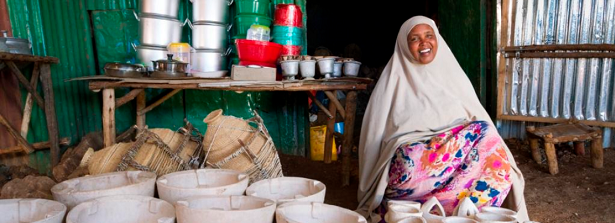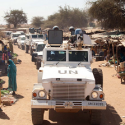Report CoP meeting “Learning partnerships for adaptive programming in fragile contexts”

How does learning for adaptive management work in fragile settings, and what are lessons from its application in Somalia, Burundi and Ethiopia? This was the central focus of the last meeting of the Community of Practice on food security & stability, held on May 28, 2020. Thirty-two participants joined this first online workshop, co-organized with the Knowledge Platform Security & Rule of Law. Participants discussed and exchanged on their experiences with learning in consortia, through concrete case studies.
The meeting focused on learning partnerships for adaptive programming, more specifically to support food security and agricultural development programmes in settings of fragility and protracted crisis. This topic had been identified earlier by CoP participants as relevant, related to the 2019 IOB evaluation of Netherlands Ministry of Foreign Affairs programming on stability and humanitarian aid “Less Pretension, more realism“. This evaluation identified a disconnect between policy and programme objectives on the one hand, and realities in context on the other. It called for more learning-based approaches and use of evidence for programming.
During presentations and discussions participants took a closer look at how learning for adaptation takes place with and between partners in consortia, what works well and what does not. The following questions were central:
- Does learning for adaptive management deliver more benefits for partners with certain types of activities (e.g. humanitarian/food security, peace, development/agriculture)?
- How to prioritize learning objectives (with local actors)?
- How to capitalize on complementarities of consortium partners as well as local actors?
Meeting report and PowerPoint presentations |
Case studies
PRIME – Pastoralist Areas Resilience Improvement through Market Expansion, Ethiopia – Presented by Mercy Corps
Operating in three regions in Ethiopia through ten consortium partners that collocate in eight offices under five technical areas, PRIME is structured to respond to complex and dynamic realities on the ground in its efforts to build resilience in pastoralist areas using a facilitative market systems approach. How can a large complex project be adaptive, flexible, inclusive and responsive?
BRCiS Consortium – Building Resilient Communities in Somalia – Presented by NRC
A humanitarian consortium (NRC, Concern Worldwide, Save the Children, IRC, Cesvi) that takes a holistic approach to supporting Somali communities in developing their capacity to resist and absorb minor shocks without undermining their ability to move out of poverty. The communities co-lead the design and the implementation. How did the consortium and the communities balance long-term goals and short-term emergency needs?
BBB – Building Bridges in Burundi – Presented by Help a Child
The programme focuses on the creation of social and economic capital and assets among young people, aimed at reducing persistent poverty, unemployment and insecurity caused in part by increasing competition and tensions over arable land. The program has a component aiming to strengthen technical, professional and agrifood skills. How is this realised in communities exposed and vulnerable to inter-ethnic & political tensions, insecurity and violence, and to poverty and wider social & economic marginalisation?






